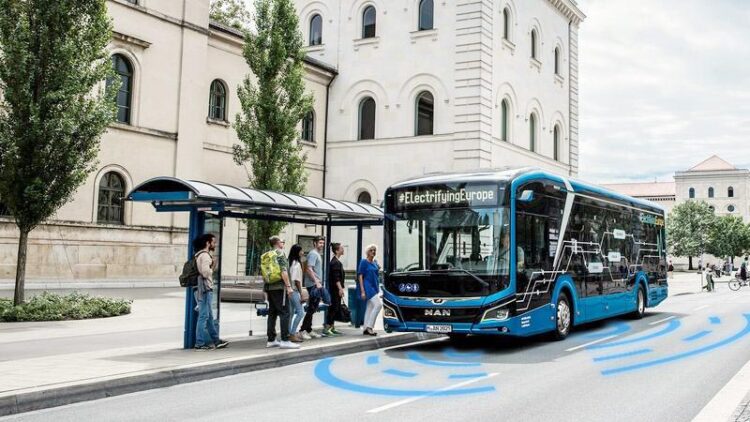MINGA research project: Automated vehicles for public transport

Autonomous bus, planned for the year 2025
(c) MAN Truck and Bus
In order to advance the automation and digital networking of public transportation in Munich, 16 partners, including the University of Stuttgart, have joined forces in the “MINGA” research project. Their goal: On-demand services to complement the subway, buses, and trams, two virtually connected electric solo buses, “bus platoons” to replace the current diesel buses, and an automated driverless solo bus.
In six work packages, the partners plan to address: the planning, financing, and regulatory aspects of automated public transport, the integration into the mobility ecosystem, a service for bundling ride requests (on-demand ride pooling), the route service of the solo bus and bus platoons, the development of a digital twin and simulation of automated public transport, and the evaluation of the systems.
On the part of the University of Stuttgart, the Institute for Engineering Design and Industrial Design (IKTD) is participating in MINGA. In the area of data ecosystems, it deals with the question of which stakeholders play a role in operations along the entire life cycle, how they interact with each other, and how the associated information flows can be represented transparently in a data communication model. In addition, researchers in “Inclusive Designs” are investigating how the elimination of bus drivers in favor of automated vehicles affects accessibility and inclusion. The goal here is to gain acceptance from all user groups (e.g., people with limited mobility or hearing and visual impairments). The researchers also want to find out how the necessary interaction interfaces must be designed.
The MINGA (Münchens automatisierter Nahverkehr mit Ridepooling, Solobus und Bus-Platoons) [Munich’s automated mass transit with ride pooling, solo bus, and bus platoons] research project is being funded by the German Federal Ministry for Digital and Transport (BMDV) with around EUR 13 million. Under the consortium leadership of the City of Munich with its Department of Construction and Mobility, the IKTD of the University of Stuttgart, the Stadtwerke München with the Münchner Verkehrsgesellschaft, the Münchner VerkehrsVerbund (MVV), the Technical University of Munich, the Karlsruhe Institute of Technology (KIT), the FZI Forschungszentrum Informatik, and the companies MAN Truck & Bus SE, ioki EbuscoDeutschland, Benz + Walter, and FryceGmbH are partners in the MINGA project. The Pfennigparade Foundation, the Association of German Transport Companies (VDV), YunexTraffic, and the district of Munich are involved as associated partners.
Wissenschaftliche Ansprechpartner:
Dr. Daniel Roth, University of Stuttgart, Institute for Engineering Design and Industrial Design (IKTD), phone +49 711 685 60240, E-mail daniel.roth@iktd.uni-stuttgart.de
Weitere Informationen:
https://www.uni-stuttgart.de/en/university/news/all/Automated-vehicles-for-publi… press release
Media Contact
All latest news from the category: Transportation and Logistics
This field deals with all spatial and time-related activities involved in bridging the gap between goods and people, including their restructuring. This begins with the supplier and follows each stage of the operational value chain to product delivery and concludes with product disposal and recycling.
innovations-report provides informative reports and articles on such topics as traffic telematics, toll collection, traffic management systems, route planning, high-speed rail (Transrapid), traffic infrastructures, air safety, transport technologies, transport logistics, production logistics and mobility.
Newest articles

Innovative 3D printed scaffolds offer new hope for bone healing
Researchers at the Institute for Bioengineering of Catalonia have developed novel 3D printed PLA-CaP scaffolds that promote blood vessel formation, ensuring better healing and regeneration of bone tissue. Bone is…

The surprising role of gut infection in Alzheimer’s disease
ASU- and Banner Alzheimer’s Institute-led study implicates link between a common virus and the disease, which travels from the gut to the brain and may be a target for antiviral…

Molecular gardening: New enzymes discovered for protein modification pruning
How deubiquitinases USP53 and USP54 cleave long polyubiquitin chains and how the former is linked to liver disease in children. Deubiquitinases (DUBs) are enzymes used by cells to trim protein…



